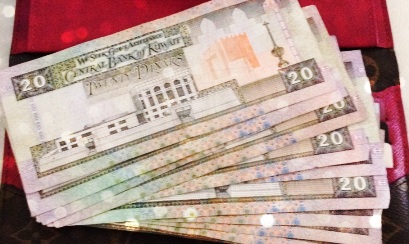
KUWAIT: According to a recent report of the World Bank on the money transfers of migrants and expatriates, Kuwait ranked third in the Gulf with $8.5 billion sent abroad in 2012, while the expats in Saudi Arabia transferred $27.6 billion, and expats in United Arab Emirates remitted $20.3 billion. The United States ranked the first worldwide with migrant transfers of $123 billion.
The report also mentioned that remittance flows to developing countries are estimated to have totaled $401 billion in 2012, an increase of 5.3 percent over the previous year. Global remittance flows, including those to high-income countries, were an estimated $529 billion in 2012. The developing world is expected to receive $414 billion in migrant remittances in 2013, an increase of 6.3 percent over the previous year. Globally, the world’s 232 million inter- national migrants are expected to remit earnings worth $550 billion this year.
Samer, a 55-year-old sends about 60-70 per- cent of his salary to Jordan every month. “I’m transferring money to my children who live there with their mother. I transfer the money on a monthly basis for their expenses only, and I’m not saving any money,” he told the Kuwait Times. The majority of the Asian community are transferring money back home, and lean more towards savings and investment.
Paul, a 52- year-old is living in Kuwait with his wife only and the rest of his family and children are living in India. “I transfer about 20-30 percent of my salary to my family abroad, but a part of it goes into savings. When we finally leave Kuwait and head home, we should have some savings to depend on. I know many Arab expats don’t save any money and spend all their salary,” he pointed out.
Victor from Nigeria transfers about 50 per- cent of his salary to his family living in two countries. “About 45 percent of my salary goes into paying the house rent. I transfer about half of my salary to both UK and Nigeria, and I live off only 5 percent. I’m not saving as my income is not enough to save. My existence is one of hand to mouth. Over the past five years, my situation has been the same which was caused by the financial crisis, when all the fees were hiked. Even transferring money is expensive now because it was $7 for $100 earlier and now it’s $14 for the same amount. Before 2008, I used to save about 40 percent of my salary, which is now impossible,” he explained.
Ibtisam, a 37-year-old Syrian expat multiplied her money transfers after the bad situation in Syria since the last two years. “Two years ago, I was transferring about 5 percent of my salary and sending it to mom for her to use as pocket money. I used to spend all my salary on myself and wasn’t saving anything. Now after the bad situation in Syria, I’m sending my family about 80 percent of my salary to Egypt as they moved there after the war started in Syria. I hope this will change once the situation gets better,” she said.
Yahya, a 30-year-old from Egypt is transfer- ring about 25 percent of his salary every month to his family back home. “I’m living with my wife and children, and the rest of family lives in Egypt and I send them money for their needs, so I haven’t been able to save much. Sometimes, I send more money if they have an emergency and need money. In general, I can’t send more money as I haven’t got a raise in my salary over the past few years,” he stated
By Nawara Fattahova


